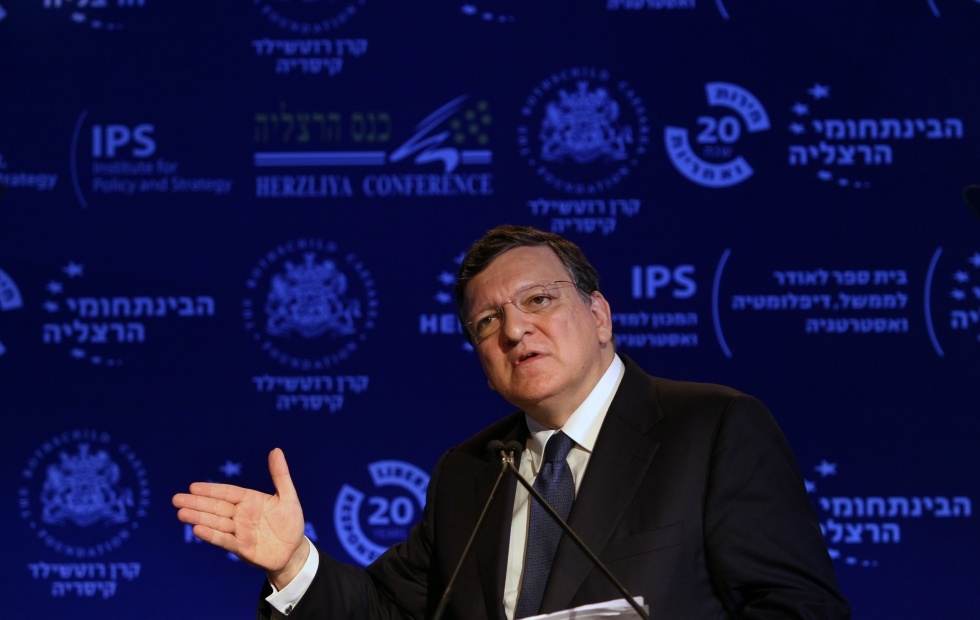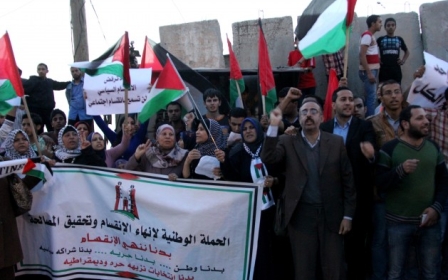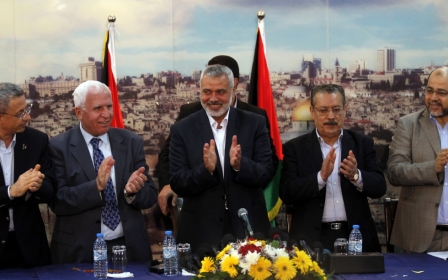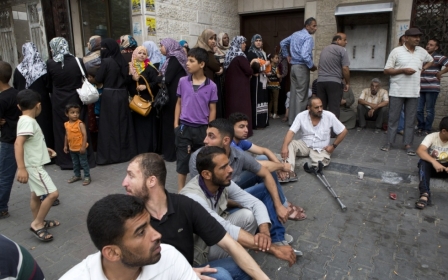European Commission chief: Palestinian unity should be 'supported'

A Palestinian unity deal with the Islamist Hamas movement must be supported, European Commission chief Jose Manuel Barroso told an Israeli security conference on Sunday.
His remarks came just days after a Palestinian unity government, comprised of political independents but backed by Hamas, was sworn-in - a move welcomed by the international community but rejected by Israel as a major stumbling block to peace.
"In the interest of a future peace deal and of a legitimate and representative government, intra-Palestinian reconciliation... should be supported," Barroso told delegates at a conference in the coastal city of Herzliya, Israel.
Any Palestinian government should uphold the principle of non-violence, be committed to a two-state solution and a negotiated settlement of the conflict, which would imply accepting existing agreements as well as recognising Israel's right to exist, he said.
When news of the surprise reconciliation agreement between Palestinian leaders in the West Bank and Gaza emerged in late April, Israel immediately broke off US-led peace talks, saying it would never negotiate with any government backed by Hamas.
"The Palestinian unity government with backing from the Hamas terrorist organisation is a Palestinian step against peace and in favour of terrorism," Israeli Prime Minister Benjamin Netanyahu said on Tuesday.
"No European country would be prepared to accept a terrorist organisation as part of its government," he said.
Barroso also called on Israel and the Palestinians to find the "political courage" to take decisive steps "to bet on peace."
"The status quo may seem politically safer in the short term, but it cannot deliver any long term gains," he said.
"Leadership is about making possible what is necessary, and peace is necessary in the region. Security for Israel and a state for the Palestinians are moral imperatives for the international community."
Also speaking at the Herzliya conference, Israeli Economy Minister Naftali Bennett, who heads the far-right Jewish Home Party, called anew for a tough response to the Palestinian government formation.
Israel should hit back by "imposing its sovereignty over Judea-Samaria (the West Bank)," he said. "I call on the prime minister to take the first step towards annexation."
But Finance Minister Yair Lapid warned that his centrist Yesh Atid party would quit the coalition government and bring down the cabinet if any such plan went ahead.
Also on a visit to Gaza Sunday, Robert Serry, UN special coordinator for the Middle East peace process, voiced the UN's support for the Palestinian unity government.
"The formation of the government of national consensus is a first step and opportunity to address the serious political, security, humanitarian and economic challenges ahead," Serry said in a statement.
He also called for lifting the blockade of the Gaza Strip and allowing the free movement of the new Palestinian ministers between Gaza and the West Bank.
Palestine succeeds in changing negative stance by International Community
On Saturday, Palestinian ambassador in Ankara said Palestine had succeeded in its efforts to change the EU's negative stance towards the country by responding to the demands of the international community. “Ten years ago, whenever Israel took a step, it used to get full support from the EU and the U.S," Nabil Maarouf told Anadolu Agency. "But we succeeded in creating a gap between EU and Israel."
In response to the formation of a new Palestinian unity government that involves Hamas, Israel on Thursday announced plans to build nearly 1,500 settler units in an area comprising the West Bank and East Jerusalem.
The move has been widely denounced by the West, with EU threatening to impose sanctions.
"We are deeply disappointed that the Israeli Land Administration has published new tenders for 1466 housing units in settlements in East Jerusalem and the rest of the West Bank. This move is unhelpful to peace efforts," EU's External Action Service said Thursday.
Maarouf said: "Previously nobody condemned Israel, but now it is criticized, condemned and boycotted. We proved that we are in favour of peace (...) and who is complicating the process is Israel. They did not respond positively to the demands of the international community."
The EU urged Israeli authorities to reverse the decision and to direct their efforts towards a resumption of the stalled peace talks.
EU-Israel relations have long been complicated, notably over the question of Israeli settlements.
Earlier, the EU took steps against Israel due to its continuing occupation of the Palestinian territories and prohibited EU investments financing Israeli settlement activities in the occupied West Bank and East Jerusalem.
Maarouf said Palestine was ready to resume peace talks on condition that Israel stopped building new settlement units.
The reconciliation deal between Palestine's rival factions Fatah and Hamas led Israel to pull out of peace talks brokered by the U.S. The talks were seeking an agreement on a "two-state solution."
Despite concerns raised by Secretary of State John Kerry, the United States has thrown its support behind the new Palestinian unity government.
"Moving forward, we will be judging this government by its actions. Based on what we know now, we intend to work with this government," State Department spokesperson Jen Psaki told reporters.
Psaki warned that the US will be "watching closely" to ensure that the government upholds principles of non-violence and recognition of the state of Israel.
Stay informed with MEE's newsletters
Sign up to get the latest alerts, insights and analysis, starting with Turkey Unpacked
Middle East Eye delivers independent and unrivalled coverage and analysis of the Middle East, North Africa and beyond. To learn more about republishing this content and the associated fees, please fill out this form. More about MEE can be found here.




